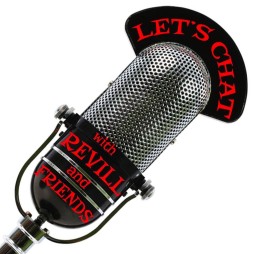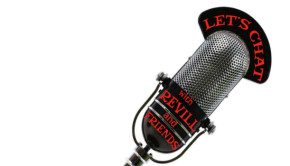Los Bros Hernandez interview, from SPX 2012
Comic fans, creators, and publishers of all ages gathered at the Marriott in Rockville, Maryland for Small Press Expo this past weekend, September 15th and 16th. The line-up this year was particularly noteworthy, with headliners including Daniel Clowes, Chris Ware, and Los Bros Hernandez. I previously wrote about Jaime and Gilbert Hernandez here, where I paid specific attention to their seminal work on the underground classic Love & Rockets. They are particular favorites of mine, and it was truly an honor when I found out that I was able to interview them.
Me: Alright, so how are you guys doing? You guys having a good time at the con so far?
Jaime: Yep, so far. I don’t know how it’s going to be this last hour…you know, might change everything? Yeah, it’s great. Actually, I was hoping for a good show, but it turned out a lot better. It’s even better than I was expecting.
Gilbert: That seems to be what everyone is saying. They’re like: “I’m doing great at this show…This show’s just like, boom!”
Jaime: Yeah, Fantagraphics is doing really well, everyone is doing really well.
Me: Nice! Yeah, and I remember seeing online that this is one of the biggest crowds there has been for one of these yet.
Jaime: Yeah, and next week we’re going to be doing another one on the west coast, which we’re hoping is going to just as, you know, fun. (laughs)
Me: Great. So, let’s go back a little bit. What text do you guys believe has had the greatest impact on your visual and storytelling techniques. It can be anything; it can be film, literature.
Jaime: Well, comics and film.
Gilbert: And our childhood.
Jaime: Those are the three main elements.
Me: Any specifics that you’d like to go into?
Gilbert: Well, movies and tv, you know, back in the ’60s there were just a lot of kids watching tv. Cartoons, you know, Bugs Bunny and whatever, tv shows.
Jaime: Like The Outer Limits, Star Trek. Completely generic here. Just whatever shows attracted kids. We’d watch a lot of monster movies especially. As far as movies go, our mom would watch dramas, and sometimes we’d get sucked into them. So we started to get into that as well. We’d see movies that weren’t just kid-friendly; they were for adults but we could appreciate them.
Gilbert: And comic books.
Jaime: No, I’m just saying, these days, you know a lot of things are “Kid-something,” “Kid-friendly,” “Kids Club,” “Something For Kids.” We took what we could get. A lot of things, we had to live in the adult world, that was on TV. So…I don’t know what that has to do with anything.
Gilbert: Well, it’s not necessarily that we want to copy old shows that we saw when we were kids, it’s simply that we learned structure, story structure, but unconsciously. We never were thinking about copying. It was what came naturally when we started doing comics.
Jaime: When we read comics, we read just about every kind of comic there was, except for romance comics. We grew up five boys, for so many years. We had a little sister later on, and she never bought comics. Our older brother bought all the comics, and those were the ones we read, none of which were romance. And it’s interesting because that’s what Love & Rockets was regarded as early on, as modern romance comics.
Me: Because everybody has to genrify something, so…
Jaime: Sure! But that was never an insult to us.
Me: A certain lexicon over the years definitely has developed within your own comics. Such terms as “Blivitz,” and “Zimble Zamble Zimble,” and I’ve always been curious about where those came from.
Gilbert: Zimble Zamble Zimble…
Jaime: Zimble Zamble Zimble was something my younger brother used to say, or he used to put in his comics. So when I put that in, it was like “OK, I want her to be happy, what should she be saying?” So it just happened. You know, silly words? I just, “OK, she’ll be saying “Zimble Zamble Zimble,” nothing behind it.
Me: Just another aspect of life that filtered into it, basically.
Jaime: Yeah! Yeah! Just for fun, letting me have fun with the comic, when it’s not so much work. You know, silly, carefree, all that stuff.
Gilbert: Blivitz…
Jaime: Blivitz… (dissolves into giggles)
Gilbert: Blivitz is actually grotesque. It’s actually another word for dingleberries.
Me: Oh!
Gilbert: But I just liked the way it sounded, sort of like a little kid, like when a little kid pops their cheek, and they make a sound like “Blub, blub, blub.” And it’s just “Blivitz,” you know, that’s what it sounded like to me. But it’s actually pretty gross.
Me: It’s like “Grundle” or something.
Gilbert: Yeah. It’s horrible…(giggling)
Jaime: (Giggling)
Me: (To Jaime) With Tonta, punk rock is back in Love & Rockets, basically. I was wondering if something sparked that.
Jaime: Um, I wanted to bring in young people because all my characters are getting old, it was becoming an old person’s story. All my characters are close to 50. I just wanted new characters, and I just wanted to start fresh, start young, because I’m hoping they’re going to grow older through the years.
Me: Oh! So this is just a tactic for extending it at this point.
Jaime: Yeah, and also Tonta, in some distant way, I just want another character like I started with Maggie. Just a character that I can do goofy stuff with. I decided to give her a funny face, because, well, just to make her different. And also, people see her differently than they would see Maggie.
Me: OK. So she’s not another Maggie, she’s-
Jaime: Right, she’s just the same kind of storytelling device. Maggie was a character I created in order to be able to tell these certain kinds of stories. Tonta’s the same way.
Me: OK. Fair enough. I have a question about iconography, actually. Do you guys believe that it’s something that you deal with head-on, or that its something that comes about naturally simply by making comics?
Gilbert: I think everything we do in comics is simply a natural progression of what came before.
Jaime: One foot in front of the other, basically.
Gilbert: So much of what we’re influenced by comes out subconsciously. We put things out on a page, we might briefly think, “Oh, this is kind of like this.” And might be some comic. Or some movie. But that’s as far as it goes. We never study things. To copy, or to present as, “This is the ultimate image of this thing.” It isn’t that thought out. That’s why we’ve been able to do comics for 30 years. We just let it flow, we just let it happen.
(Fantagraphics staffer frantically gestures to hurry things along)
Me: Alright, I guess this is almost the end so I have one last question to ask Gilbert. I recently saw a picture of you with one of my personal heroes, Russ Meyer. I was wondering how that happened and if his work has had any influence on yours?
Gilbert: It had an influence on me because, well, it just happened I came upon his work when I was a young teenager, so of course my main attraction to his films was the women. I couldn’t believe he could put women in these movies that looked like that. It really just blew my mind. But that was only in stills and photographs. Once I saw the movies, I couldn’t believe what I was seeing!
Me: They’re hilarious.
Gilbert: They’re hilarious and energetic, but also real sinister and violent. This was over-the-top for me, this was an over-the-top, crazy world. I lost the desire for it to be erotic, because he wouldn’t allow his films to be erotic.
Me: Right, he has to make them problematic.
Gilbert: Absolutely, the films are not erotic, yet the women are completely gorgeous, so that’s why I kind of learned, “Well, you can have a different kind of story using these kinds of women.” That’s a really weird way to look at it. I met Russ Meyer because my wife worked in a Hollywood memorabilia, and the guy who ran it, he just happened to know all kinds of B-movie actors and directors, he happened to be part of that world. So they were always coming to the store for signings, and this and that. Russ Meyer knew a lot of actors in that field as well, obviously. So I just took advantage of that and had the picture taken.




4 Responses to Los Bros Hernandez interview, from SPX 2012